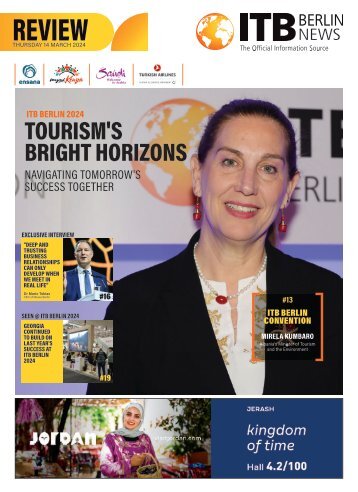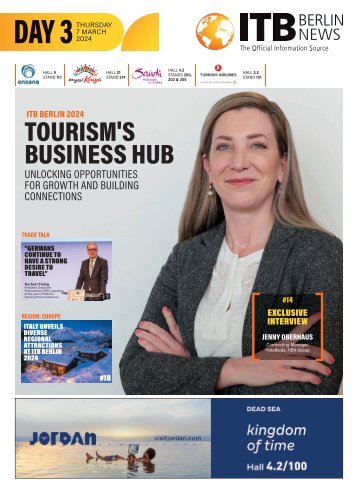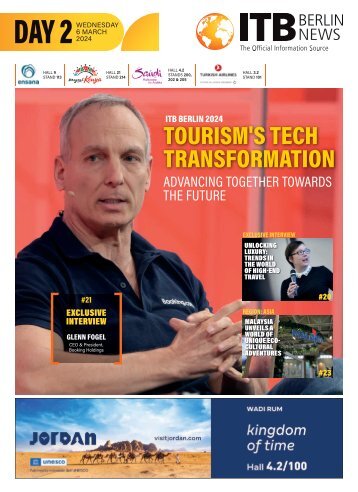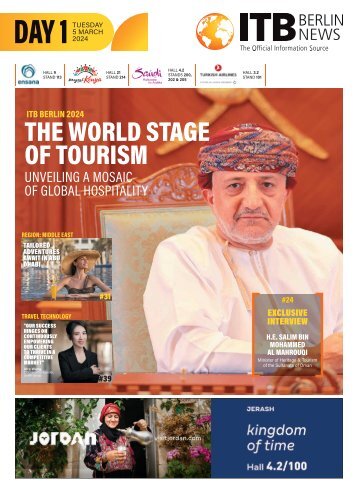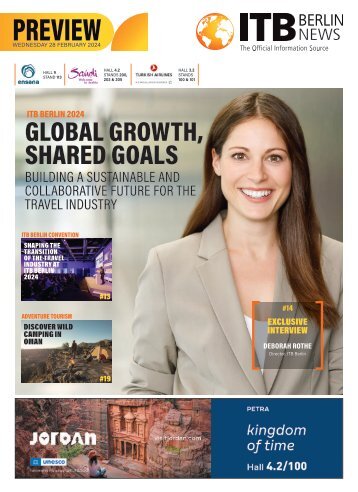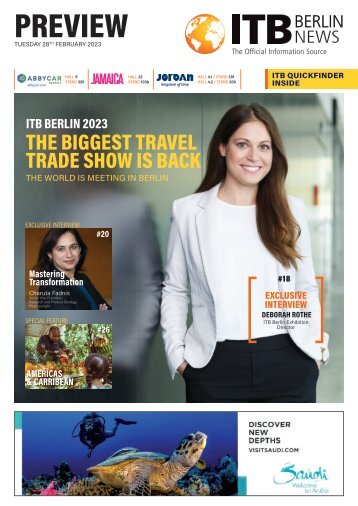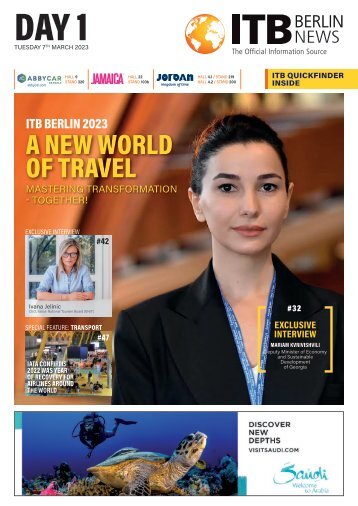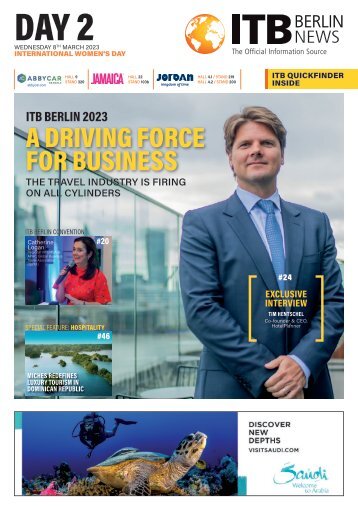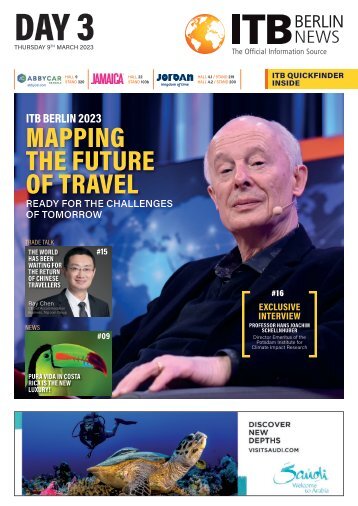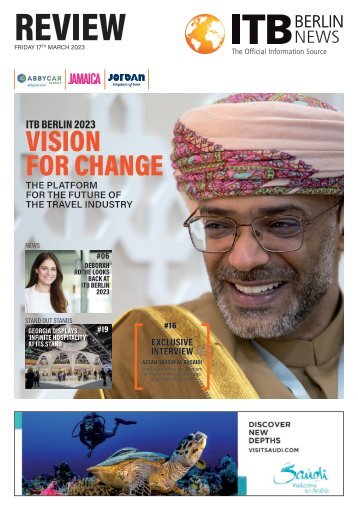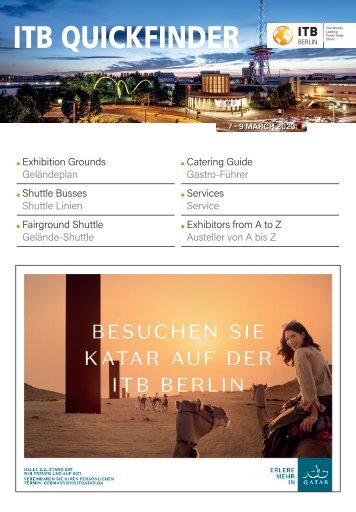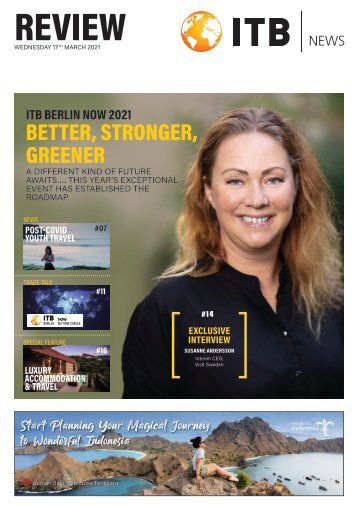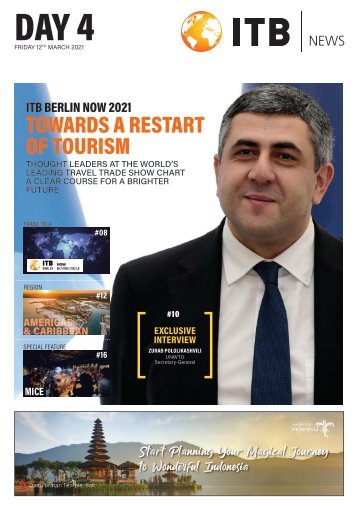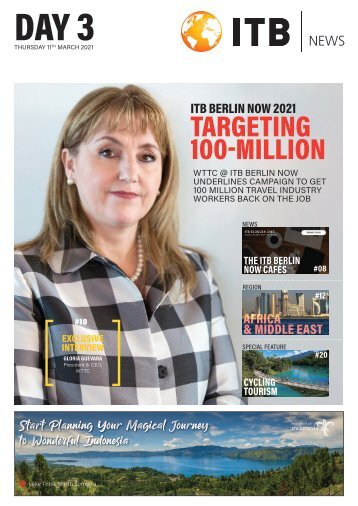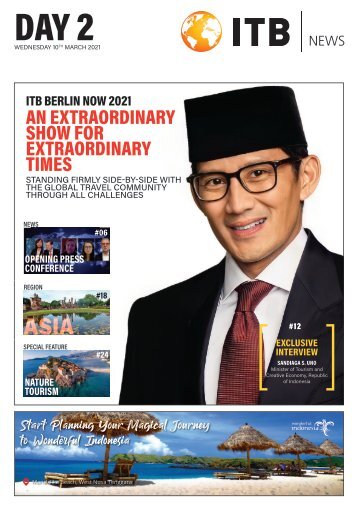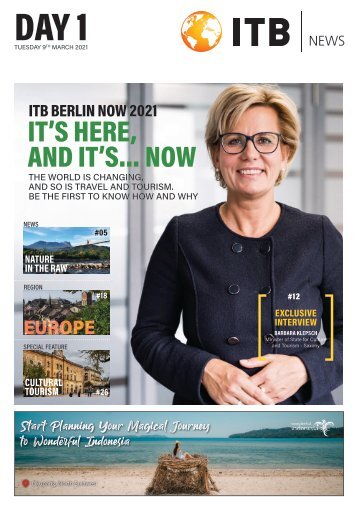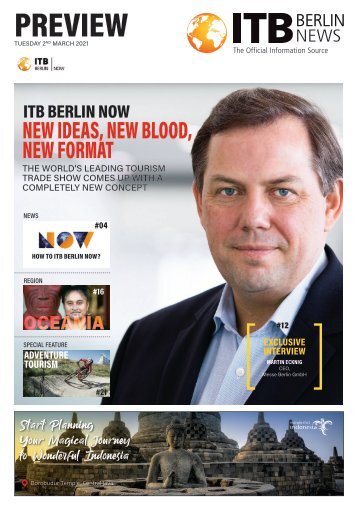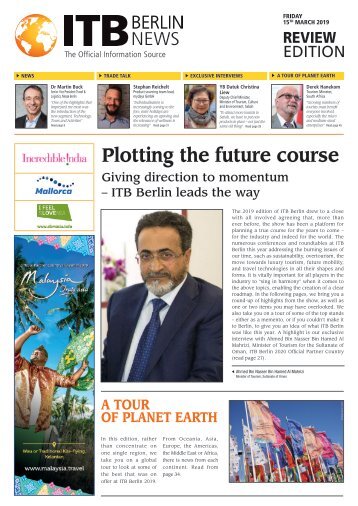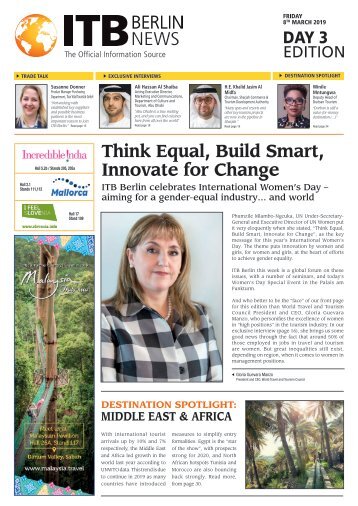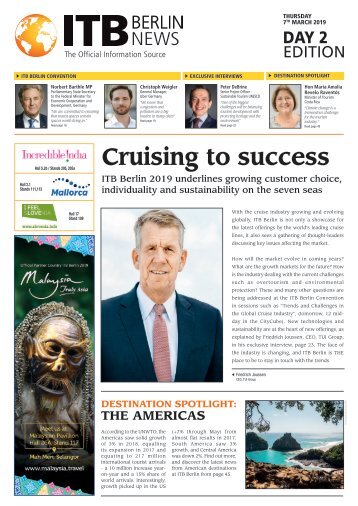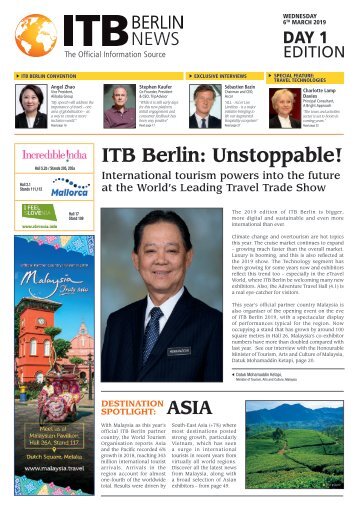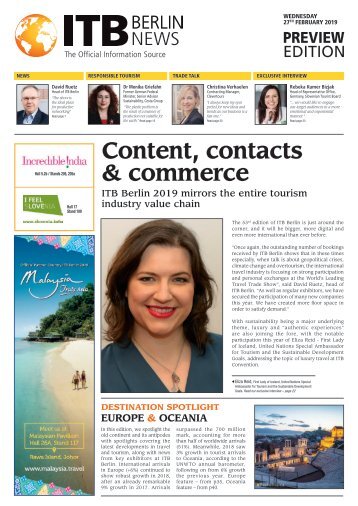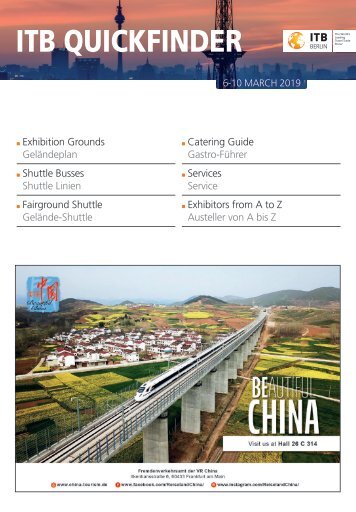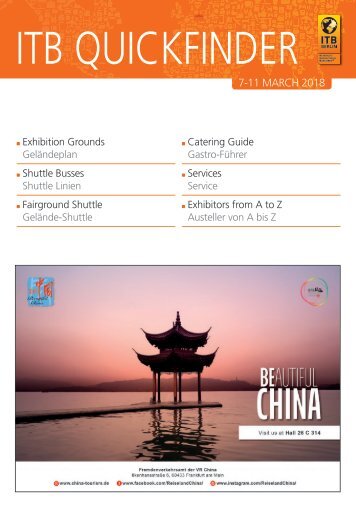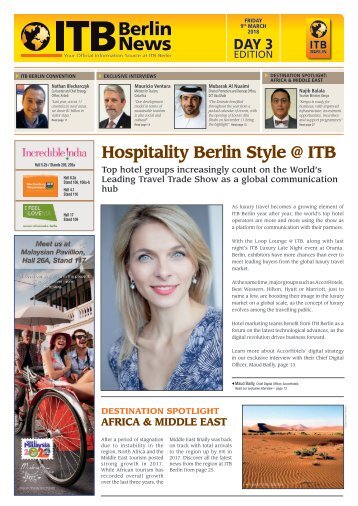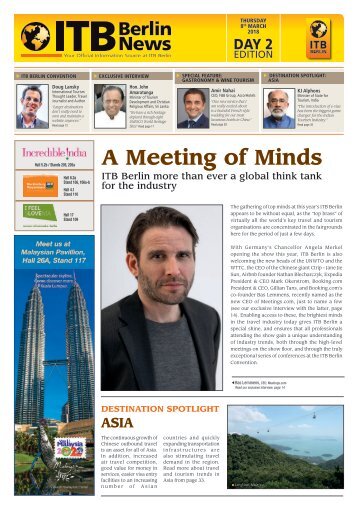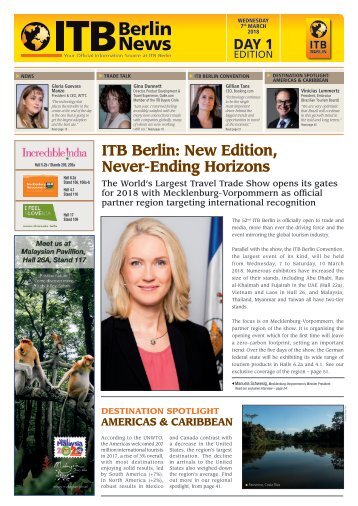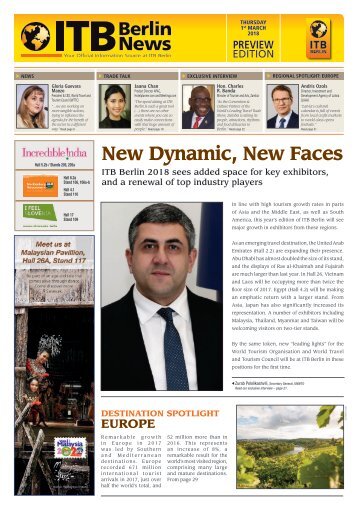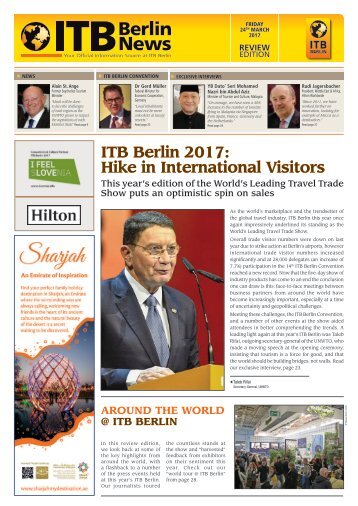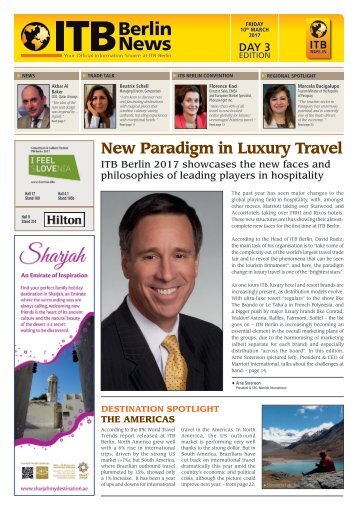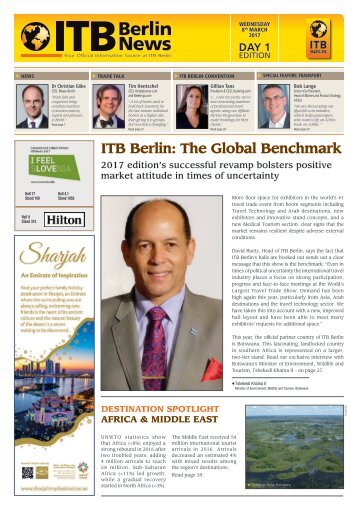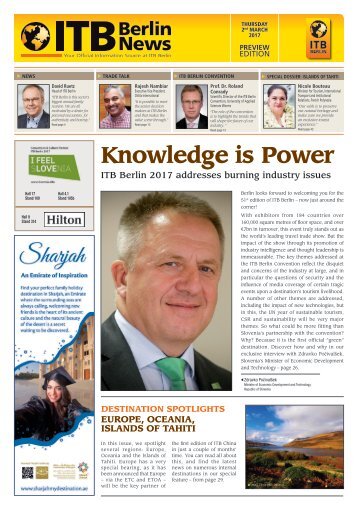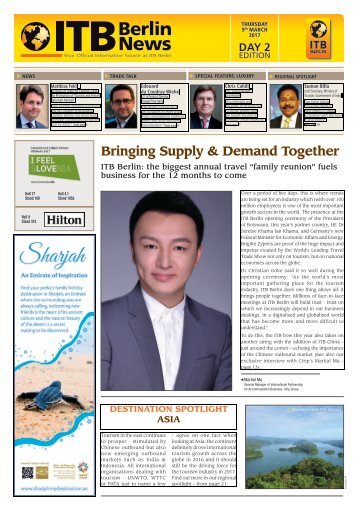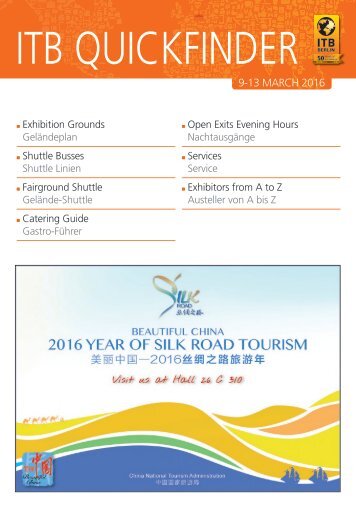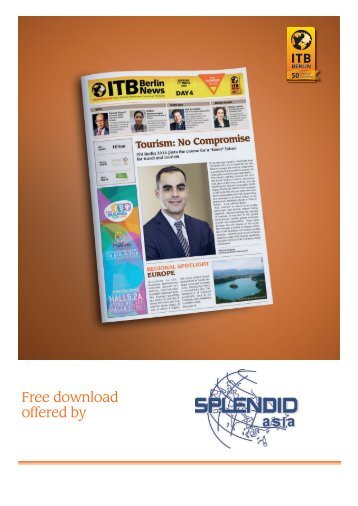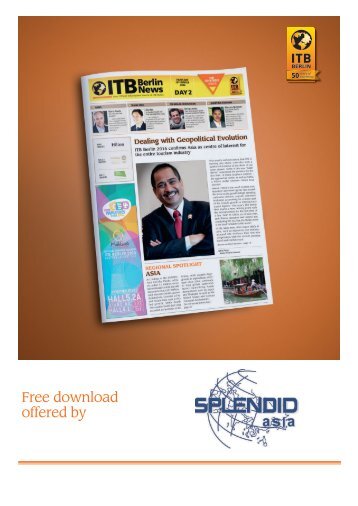
ITB Berlin News - Day 3
- Text
- Berlin
- Tourism
- Destinations
- Destination
- Cultural
- Sharjah
- Region
- Hotels
- Exhibition
- Americas
12 ITB
12 ITB BERLIN CONVENTION Florence Kaci Director, Sales, EMEA and European Market Specialist, Phocuswright Inc. Norm Rose Senior Technology and Corporate Market Analyst, Phocuswright Inc. PHOCUSWRIGHT FAST TRACK AT ITB BERLIN Category: eTravel Stage Day 2 EXPLORATION OF EUROPE’S PAYMENTS LANDSCAPE Category: eTravel Stage Day 2 Millennials Driving Growth in Emerging Markets Emerging Tech and Payment Trends in Travel On 9 March, Florence Kaci, European market specialist with travel research industry authority, Phocuswright, presented key findings from recent European traveller research on ITB Berlin’s eTravel Stage. At the conference, it was revealed that the global travel market is now at nearly US.3 trillion dollars, up substantially from .1 trillion just five years ago. But the story doesn’t end there. Innovation, demographics, and economic promise have caused record online travel gains. In less than 20 years, online travel has grown from nothing to more than 0bn in 2016. More than 40% of all travel is now booked online globally for leisure/unmanaged business travel. In terms of online penetration, Europe is in the lead with nearly half of all travel booked online, followed by the US. But if you’re looking for growth – the next big wave – look no further than emerging markets, including China, India and Brazil. While developed markets make up three quarters of online travel revenue, they are projected to grow just 3% over the 2014- 2017 period. Emerging markets’ projection – 8%. And online emerging markets are expected to grow nearly four times as fast as developed ones. What’s driving this growth? We’ve all heard about millennials playing a key role in everything from the sharing economy, to hotel technology, to redefining loyalty. In three emerging markets, China, Brazil and Russia, millennials make up an inordinate percentage of the traveller population, compared to the US, France or Germany. And in India, two in three holiday travellers are young adults. For many of these travellers, their first digital interaction with brands is happening via a smartphone – a major contrast with markets like the US and Europe. Developing markets such as China, Brazil and Russia lead in smartphone penetration. Asia, for example, far surpasses the U.S. and Europe in terms of mobile online bookings The European payment landscape stands at a crossroads. While traditional forms of payment still dominate in most markets, travel suppliers and intermediaries across the region must embrace both traditional forms and emerging, often country - or region-specific payment methods, in order to be the engine for growth. Norm Rose, senior technology and corporate market analyst with travel research industry authority, Phocuswright, presented on 9th March at ITB Berlin’s eTravel Stage about Europe’s payments landscape, outlining in particular the following trends: 1. MOBILE Mobile technology continues to disrupt the travel experience, but has not yet impacted the European payment process. Only 8% of survey respondents currently support mobile payments. Another 14% do not currently support mobile payments. Some retailers, wholesalers and suppliers questioned whether mobile payments for travel is practical due to the high individual cost of travel components and low mobile booking penetration. Travel suppliers are more likely to offer mobile payments than retailers, which are typically smaller, with online travel agencies (OTAs) being the exception. Mobile payments will begin to take off in Europe when mobile bookings become a mainstream activity. Even though consumers are increasingly using mobile devices for travel planning, the majority of digital bookings continue to come from desktops. 2. BLOCKCHAIN There is little (2%) acceptance of Bitcoin or other crypto currencies in Europe today, but Blockchain – the underlying technology that supports crypto currency – may have a more significant impact. Blockchain is an open, distributed, viewable and encrypted shared ledger. The data is encrypted in such a way that even though everything is being computed in plain sight, the underlying “meaning” of the information is completely obfuscated. 2016 saw a tidal wave of interest in Blockchain with large companies launching an open-source Blockchain initiative. The embracing of Blockchain technology by large technology and financial companies will likely have an impact on the European payment process within the next three to five years ITB BERLIN NEWS • Friday 10 th March 2017 www.itb-berlin-news.com
ITB BERLIN CONVENTION 13 Jon Barnett General Manager Goodwood Motor Circuit Rob Holmes Founder and Chief Strategist, GLP Films HOW TO CREATE GLOBAL MEGA EVENTS FOR ENTHUSIASTS Category: ITB Destination Day 3 Date: March 10, 2017 Time: 10:45 a.m. - 11:15 a.m. Location: Hall 7.1a, Auditorium New York 1 ROI OF STORY TELLING: KEYS TO SUCCESSFUL CONTENT MARKETING CAMPAIGNS Category: eTravel Stage Day 3 Date: March 10, 2017 Time: 11:00 a.m. - 11:30 a.m. Location: Hall 6.1, eTravel Stage Global Mega Events Essentials Authentic Stories Make Successful Content Speaking at the ITB Convention on the subject “How To Create Global Mega Events For Enthusiasts” Friday 10 March, Jon Barnett, General Manager of Goodwood Motor Circuit is well-placed to advise best practices, as he has helped transform the specialist destination of Goodwood, UK, into a successful ‘pilgrimage’ site. Barnett explained to ITB Berlin News what impact his annual events – Goodwood Festival Of Speed and Goodwood Revival have had on the region’s economy: Goodwood as a whole contributes around £245million to the economy each year and employs 650 full time staff. We are very proud of that because estates have historically always been about supporting their community. Rolls Royce has a plant on the estate after Lord March persuaded them that being in England was good for them. They associate with Goodwood because they need to cement in people’s mind that they are a perfectly-made English motor car and they can bring their customers here all the time to demonstrate that. What is the secret in organising a mega-event that positively impacts a region? At Goodwood we have a great events teams that constantly strive to over deliver on content and experience. One of the most important qualities to have as an event organiser is attention to detail and we are renowned for our obsession for perfection at Goodwood. We also work very hard to ensure the customer journey is exquisite and that the negative impact on the region is minimised. Lastly, we have been entertaining people on a grand scale for over 300 years. Authenticity is key to all we do - if we can’t genuinely claim to be an authority on a particular subject, the chances are we won’t do it. What are the pitfalls to avoid? You need to make sure you claim a business area that is rightfully yours and that is in your DNA as a business. Do that beautifully and over-deliver on the customer experience, making them want to come back Having hosted its fourth annual Short Film Showcase at ITB Berlin Thursday 9 th , which featured their best travel storytelling content so far, GLP Films leads a session entitled ROI Of Story Telling: Keys To Successful Content Marketing Campaigns (Digital Storytelling, Distribution, Case Studies & Beyond) Friday 10th. Speaking to ITB Berlin News, Rob Holmes, Chief Strategist at GLP Films, expanded on what makes for successful content marketing: As well as our Short Film Showcase, we will also present the latest ROI Case Study from our award-winning film and share the best strategies and lessons for destination marketing. A compelling story is the most important ingredient -- a story that authentically connects your audience to your destination. Once you have a great story, you can use that story to meet key campaign goals like raising brand awareness or increasing website traffic and sales. What is one of the greatest challenges destinations are facing today? By 2030, international tourist arrivals are set to hit a staggering 1.8 billion worldwide. Like any large global industry, tourism can devastate destinations when left to grow freely without strategy, management, or awareness of impact. Destination managers are now faced with the balancing act of promoting growth while ensuring the longevity and health of the very places that makes a destination attractive. What are some of the solutions? Strategic marketing campaigns can support sustainable destinations in a number of ways. Market lesserknown products and promote offseason travel to better disperse travellers and ease overcrowding issues. Also, educate travellers on the unique and authentic aspects of the region that will in turn empower local communities. What advice would you give to destinations looking to improve their content marketing strategies? Start with storytelling. The secret is destinations already have great stories -- culture, people, food, and environment. Authentic storytelling will elevate your destination, connect with your target audience, and help protect the assets that make your destination unique ITB BERLIN NEWS • Friday 10 th March 2017
- Page 1: FRIDAY 10 th MARCH 2017 DAY 3 EDITI
- Page 4: 4 NEWS ADVERTORIAL Rediscovering Th
- Page 8 and 9: 8 NEWS Turkey Expands Presence, Sho
- Page 11: TRADE TALK 11 Pleasure Travel Is Ou
- Page 15 and 16: SPECIAL FEATURE CULTURAL TOURISM 15
- Page 17: SPECIAL FEATURE CULTURAL TOURISM 17
- Page 20 and 21: 20 SPECIAL FEATURE FAMILY DESTINATI
- Page 22 and 23: 22 REGION AMERICAS © Max Bosio MAI
- Page 24 and 25: 24 REGION AMERICAS Petra Cruz Direc
- Page 26 and 27: 26 REGION AMERICAS Miami Goes the W
- Page 28 and 29: 28 SPOTLIGHT ON GERMAN REGION: BERL
- Page 30: 30 Hospitality WHERE TO GO IN Berli
Inappropriate
Loading...
Mail this publication
Loading...
Embed
Loading...
